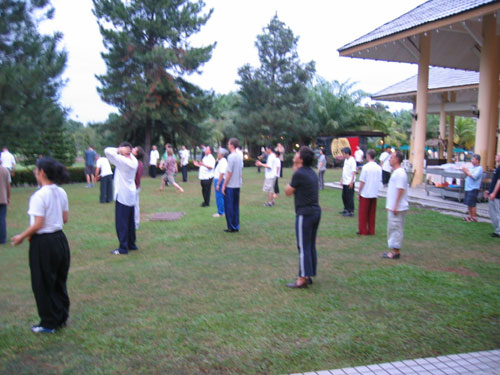WORRYING UNNECESSARILY

Don't worry unnecessarily
Question
If half the time one practices chi kung one keeps his chi flow gentle and swaying and the other half of the time the chi flow is more free, is there anything to worry or be careful about?
-- Aaron, USA
Answer
The short answer is that there is no harm. Just enjoy your practice and don't worry unnecessarily.
In fact, don't worry at all. In your example, you did not make any mistake. But even if you had made some mistakes, there would not be harm because your chi flow would automatically clear the side-effect that the mistake might have caused.
Actually the short answer above is sufficient. For those interested, the following is a longer answer.
Many students worry unnecessarily. This is partly caused by mediocre chi kung teachers, especially those who teach gentle exercise instead of chi kung but they themselves may not be aware of it, who perhaps trying to cover up their own inadequacy, dramatize the side-effects of wrong chi kung practice. Many of such mediocre teachers also advise their students to pursue a puritan life, such as not taking sugar, coffee or cakes. Some even advise their students to abstain from sex.
Such a mistaken concept is quite pervasive in the West. An assuring fact is that if one could enjoy good food and wholesome sex as well as make some mistakes in his exercises without serious damage before learning chi kung, he should be able to do better after learning chi kung. Otherwise, why learn chi kung?
Practicing chi kung is safer than swimming or driving a car. Of course you have to first learn it correctly. Hence, you should differentiate between not worrying unnecessarily with not learning it correctly. They are two different issues. As you have learnt chi kung correctly, you need not worry unnecessarily when you practice. Even if you make some mistakes due to carelessness or forgetfulness, your resultant chi flow would be more than sufficient to erase the harmful side-effects.
This is different from someone who learns chi kung wrongly, such as from a book or an incompetent instructor. Practicing wrongly, which is different from making mistakes once a while due to carelessness or forgetfulness, would bring harmful side-effects. The more powerful the chi kung is, the worse would be the harmful side-effects.
On the other hand, even if you practice correctly but you worry unnecessarily, you may have harmful effects. In fact, if you worry when you practice, you are not practicing correctly. The instructions clearly state that the practitioner should not be worrying in his practice; he should enjoy himself.
You should also note that “not worrying” does not mean you do not pay attention to the instructions. You follow the instructions as best as you comfortably can, but you do not worry about whether what you are doing is perfect. Even when you realize that you made a mistake, you do not worry about it, taking comfort that your chi flow will erase the side-effects caused by the mistake. Of course you would correct the mistake the next time you practice.
LINKS
